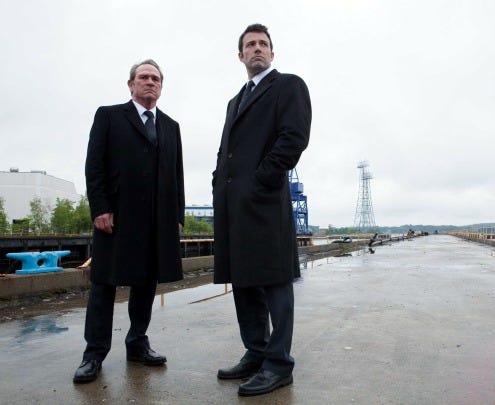The Company Men

Something has gone seriously askew in America.
There was a time, not so long ago, when the heads of a company would be ashamed to show their faces if their business performed so poorly that they were forced to let workers go. CEOs were well paid, but did not earn 700 times the salary of his or her average employee. When times were lean, sacrifices were shared around — as were the fruits when money rolled in.
Now, companies still making a decent profit lay off 30-year employees to jigger the stock price a little bit higher. The top dogs demand and receive bonuses that could've paid the salaries of hundreds of people let go. Executives decorate their offices in mahogany and Degas paintings while working stiffs watch as their houses are foreclosed.
"The Company Men" is about the big and the little guys. It's a searing portrait of a corporate culture utterly lacking in human values and the people who are rolled over by it. It's an effective drama, even if writer/director John Wells is occasionally a bit heavy-handed with his us-versus-them shtick.
But in these dark times, a lot of people who have lost jobs will see this movie and recognize those feelings of resentfulness, anger and — most excruciatingly — sudden anonymity.
"You know the worst part? The world didn't stop," one canned veteran wails. "My life ended and nobody noticed."
Bobby Walker (Ben Affleck) is a rising star, the regional sales director for GTX, a former shipbuilding company that has diversified into a behemoth. He is 37 years old, makes $160,000 a year, drives a Porsche, has the prototypical mini-mansion in the Boston suburbs and a wife and two kids.
Bobby thought he'd be safe from the latest round of cuts after having been given the personal assurance of a patron high up in the company. But he gets pink-slipped, and the scene where he carries his belongings to the parking lot, and sees a dozen others holding the same cardboard boxes, is a punch in the gut.
At first, Bobby is in denial about his situation. He thinks he'll have another job lined up long before his severance runs out. He insists on paying exorbitant golf club fees and dry-cleaning bills while the mortgage teeters because, as he tells his wife Maggie (Rosemarie DeWitt), "I need to look successful."
But the hiring market is a bleak slog of unreturned phone calls, long waits in waiting rooms and interviewers who don't even bother to stop eating while they talk to you.
"The Company Men" is sprinkled with a raft of strong supporting performances. Tommy Lee Jones gives an Oscar-worthy turn as Gene McClary, who helped built GTX from the ground up but has become disillusioned by its dehumanizing slide. His partner, James Salinger (Craig T. Nelson), insists they're not responsible for employees losing their jobs because the market demands it.
"We work for the stockholders now!" he thunders.
Chris Cooper has an almost feral energy as an upper-level exec who clawed his way up from the factory floor only to face professional extinction. A job placement consultant coldly advises him to dye his gray hair and omit any mention of his Vietnam military service from his resume.
Maria Bello plays the seemingly heartless human resources chief, whose main job seems to be telling people theirs no longer exists.
I especially liked Kevin Costner as Jack, Bobby's brother-in-law. A blue-collar contractor who used to needle Bobby about assisting in the corporate migration of jobs overseas, it's the sort of small, unshowy role that forms the connective tissue of movies like this — one on which stars usually take a pass.
Will people be too depressed this winter to go see a movie that depicts what a soul-crushing affair it is to lose your job? If a solid, worthy film like "The Company Men" fails to get hired by audiences, we're all doomed.
4 Yaps



